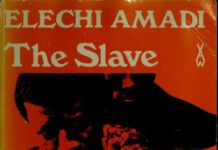Chapter 2 of Buchi Emecheta’s The Slave Girl is titled ‘Felenza.’ It narrates how Ogbanje Ojebeta’s parents die while she is six years of age.
At age six, Ojebeta still sucks her mother’s milkless sagging breasts. Her parents do not discourage it nor reprimand her for it.
She was a loved child, over-decorated with trinkets and expensive tattoos.
The Slave Girl (p. 19)
She only needs to say ‘Mother, I want to suck’ (p. 15) for Umeadi to oblige her.
At the beginning of this chapter, Nwosisi’s family come to the market for the second burial of the reticent man who had died quietly. Through their funeral procession, the author intimates the readers about the intricacies of second burial and the freedom it brings to the wife of the bereaved.
Adding to the gloominess in the air is the rumour going around about a kind of sudden death spreading in Isele Azagba. Ibuza’s town’s runner has been sent to the area to confirm the rumour.
Umeadi and other women are standing in their twos and threes sad-faced discussing these issues.
The town’s runner returns and confirms the rumours are true. ‘There is a kind of death coming from across the salty waters,’ a white man’s death spread through poisonous gases in the air. The white men to Ibuzans are the ‘Potokis.’ The disease is called Felenza. It has killed many people in Isele Azagba and it is creeping to Ogwashi.

The town’s runner relays this news to the diokpa (the eldest man in the village) who in consultation with the elders of the town warns every other person in Ibuza about the eventuality of Felenza.
The people of Ibuza are unable to fathom why the Potokis will shoot death into the air for them to breathe in and die.
Okwuekwu Oda, Ojebeta’s father, is one of the first to die of the white man’s death in Ibuza. He had gone to the farm despite remonstration from his wife not to because of his headache. He insists on going, claiming he doesn’t ‘want to die lying down like a crockety old man’ (p. 20). His body is carried home in the evening by some people, having been killed by Felenza.
After Okwuekwu’s death, his eldest son, Enuha, left home in search of a European job in the height of Felenza.
Ojebeta’s mother, Umeadi, is ‘confined to her hut like a prisoner until her months of mourning were over’ (p. 22).
One morning, after a fine rain, Umeadi too dies in her makeshift mourning hut:
Her mother Umeadi had gone too, and had been taken away from her by the same felenza.
The Slave Girl (p. 23)
Thus, Ogbanje Ojebeta is stripped of her both parents by the poisonous gas the Germanis are said to have blown into the air in fighting the British in 1916.
Ironically, she, a purported Ogbanje, clings to life:
‘You belong to the land of the living, Ogbanje Ojebeta.’
The Slave Girl (p. 23)
This chapter narrates how Ogbanje Ojebeta in her sixth year becomes an orphan in the space of months and is left at the mercy of her brother Okolie, her mother’s friend Ozubu, and her paternal aunt Uteh.
The chapter also draws on the Igbo belief that there is life after death:
‘… she (Umeadi) will need to cook for your father in the land of the dead. Look, I have even filled a big calabash with soap for her, so that she will never lack any.’
The Slave Girl (p. 23)
This excerpt reinforces the Igbo’s cosmology of life after death.
 WHATSAPP: Click HERE to join the new Literature PADI WhatsApp group to receive latest updates on your phone and for further literary discussions!
WHATSAPP: Click HERE to join the new Literature PADI WhatsApp group to receive latest updates on your phone and for further literary discussions!









